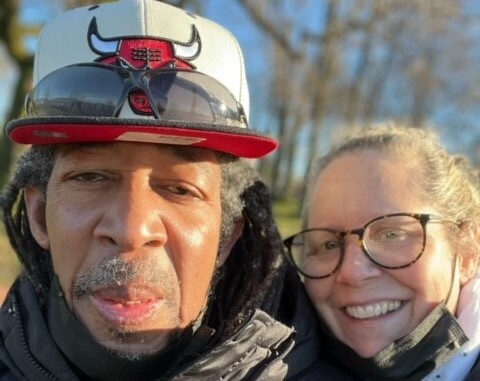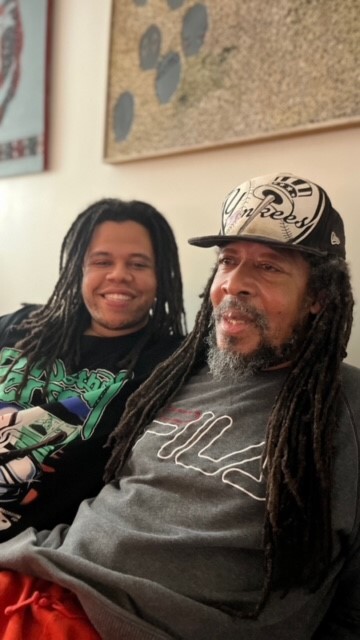In May 2021, Heather Sosa, a Vancouver resident, received distressing news from her husband’s medical professionals — they diagnosed him with a mental illness and admitted him to a hospital out of fear for his safety.
But as time unfolded, it became apparent that the initial diagnosis was incorrect. Contrary to the earlier assessment, Heather’s husband, Curt Sosa, was grappling with young-onset Alzheimer’s disease.
Curt was only 62 years old at the time of his diagnosis, but Heather said he had exhibited signs of the disease years earlier. She just didn’t know it was.
“He had more anxiety and there was a depression,” she told Global News. “But I wasn’t so concerned because he was in touch with his doctor almost weekly. So I thought, ‘OK, whatever is going on, the doctor is obviously seeing this, too.’”
But unfortunately, Heather said her husband’s doctor missed the signs. His depression turned into delusions and hallucinations, leading Heather and their family to begin worrying about Curt’s safety.
After getting a mental illness diagnosis at a psychiatric patient centre in Vancouver, Curt was given antipsychotic medication.
“But it just kept getting worse and worse. And we were having regular appointments at the hospital. And finally, they decided they needed to commit him because of how bad it had gotten, as even had an exacto knife in his sock that day,” Heather said.
Curt Sosa (left) and Heather Sosa (right).
Heather Sosa
After 30 days in the psychiatric centre, Curt’s doctors remarked that he didn’t seem like other patients. He was then discharged and that’s when the term dementia started to be used.
“I didn’t understand dementia,” Heather said. “When the doctor said this … ‘early onset Alzheimer’s,’ I’d never heard of it.”
Heather was so unaware of the disease that she asked one of Curt’s doctors when he could go back to work — an aspiration he had expressed. But the doctor told her, “Oh no, he will never work again.”
At that moment, Heather said she started crying, realizing that her family’s life was about to undergo an irreversible and significant shift.
“Once he was diagnosed, my mission was that everyone needs to learn more about (young-onset Alzheimer’s),” she said. “How many people are being treated for mental health, but really, they have dementia, and no one’s considering a younger person to have dementia? They automatically were just thinking mental health.”

Dementia is not ‘an old person’s disease’
A growing number of Canadians are developing dementia in their 60s, 50s, 40s and even earlier, and experts are not sure exactly what is behind the worrisome rise.
That is according to the latest landmark study by the Alzheimer’s Society of Canada, which was published Monday morning. Called The Many Faces of Dementia in Canada, the large study looks at the groups of people who will likely develop dementia over the next three decades.
Younger Canadians are one of these groups.
Although dementia care is usually organized for people in the 70s and 80s, the study said there is a growing amount of “young-onset dementia” in the country.
In fact, by 2050, the study estimates that there could be a surge of 187 per cent to 40,000 people under the age of 65 living with dementia in Canada. In 2020, the estimate was 28,000.
That projected increase is even larger for in Indigenous communities, where the report forecasts a 273 per cent surge in young-onset cases by 2050.
Overall, the Alzheimer’s Society of Canada estimates there are currently 650,000 people living with dementia in the country.
The idea that dementia is an “old person’s disease” is not just stigmatizing, it’s also a myth, the Alzheimer’s Society stated.
“We use the term young-onset dementia to refer to anyone that develops the symptoms of dementia under the age of 65,” Joshua Armstrong, a research scientist at the Alzheimer Society of Canada, told Global News. “Previously, it might have been called early onset, but we’ve kind of avoided that term so we don’t get confused with the early stages of dementia.”
There isn’t so much a “drastic increase” in young-onset dementia (compared with older adults), Armstrong said, but rather a better recognition of the fact that it is occurring across our population. He also believes that people suffering from young-onset dementia have “unique challenges in their life.”
Get the latest Health IQ news.
Sent to your email, every week.
“A lot of the focus has been on older adults with dementia,” he explained. “So that has somewhat been to the detriment of those younger ages who develop dementia because the care systems are set up for older adults. And the research has been focused on later-onset dementia.”

Heather is keenly aware of these unique challenges.
Not only did Curt have to give up his career as a musician, but this also cut into the family’s finances as Heather was forced to sell a retirement property to help pay for the bills, such as hiring a support worker. She is also working full-time as a career director at a local art school and looking after her husband.
“I’m in this state of fight or flight every day trying to figure out how to enjoy every moment with him now while dealing with my own emotions and working full-time,” Heather said. “I wonder how the future is going to be…. I still almost cry every single day, I’ve just learned to kind of control it.
“I am grieving the loss of my husband and knowing that with Alzheimer’s, you will eventually die from it. So I knew that was going to be the outcome.”

Curt and Heather Sosa have been married for 35 years.
Heather Sosa
Roger Wong, a board member of the Alzheimer Society of Canada and a clinical professor of geriatric medicine at the University of British Columbia, calls the young-onset dementia families those in the “sandwich generation.”
“They have to look after older adults, their parents, their parents-in-law, and as well as their own younger children,” he explained. “There’s a lot of expectation for them to provide care to both of those generations.
“If those individuals develop young-onset dementia, they themselves need care. So who is going to provide the care to them, let alone to their older adults and the younger children in the household? So that is also a very unique.”
What is young-onset dementia and why is it growing?
The core feature of dementia is that no matter the age, there is a decline in one or more areas of cognition (attention, executive function, memory, learning, language, or perceptual-motor or social cognition), which interferes with the person’s independence, the study stated.
And for young Canadians, Alzheimer’s disease is thought to be the most common cause of young-onset dementia. For those impacted by Alzheimer’s disease before the age of 65, the first symptoms are similar to those of later-onset Alzheimer’s disease: memory loss and difficulties finding words, the study stated.
A 2022 report from the Canadian Institute for Health Information found that around three per cent of the people living with dementia in Canada are under the age of 65.
Physicians often face challenges in accurately diagnosing the condition, as highlighted in the report. A contributing factor is the limited knowledge and awareness of this disease.

“There is recent research that has recognized that maybe we’ve underestimated the rates that were in the past and that they are actually higher than we thought. So a greater recognition may lead to increased numbers in younger onset,” Armstrong said.
Wong said to better understand why young-onset dementia is growing in Canada, more research is needed.
“Let’s start by making sure that are we aware of how many people in our communities are affected by young-onset dementia. There is a need for a national tracking database,” he said. “We don’t have that tracking system.”
Much remains unknown about young-onset dementia, he emphasized, particularly concerning the biological and social factors that influence the progression of this disease. According to the Alzheimer’s Society of Canada, most cases of Alzheimer’s disease are sporadic, meaning they do not run in families. Only rare instances of Alzheimer’s disease are inherited or familial, accounting for less than five per cent of all cases.
“We’re doing a lot of research in dementia overall. But how do we focus on the young-onset dementia? Are they the same or are they different? We don’t know yet,” Wong said.
Heather believes that had her husband been initially diagnosed with young-onset dementia instead of a mental illness, it would have made a significant difference.
“It really would have because he felt stressed all the time. I could see he even shared in the early days, ‘I don’t like how I feel. I got to get better.’ He knew something was wrong,” she said.
If they had known, Heather stressed that they could have made lifestyle changes and planned more for the future.
Early diagnosis is paramount for dementia, Armstrong said. This is especially true for young-onset dementia, as some forms of cognitive impairment could be reversible, he said.
Diagnosis of dementia can typically be done with blood tests, review of symptoms, cerebrospinal fluid analyses, neuroimaging and tissue biopsies, the report said. However, it added that diagnosis for those under 65 can be difficult, often leading to misdiagnoses stemming from a lack of awareness and education.
In terms of what caused Curt’s Alzheimer’s disease, Heather said the doctors believe the trigger may be related to a head injury he had in 2008. After the injury, Heather said she started noticing a personality change in her husband, but it “would come and go” so she didn’t think too much about it.
She added that Curt was also a very healthy person, he went for walks, didn’t eat a lot of sugar or salt, loved playing music and was very independent.
But there were other red flags.

Heather said Curt’s Alzheimer’s has rapidly progressed since diagnosed in 2021.
Heather Sosa
Curt has two brothers, with one residing in New York, diagnosed with Alzheimer’s, and the other in Trinidad, displaying early signs of young-onset dementia, Heather said.
Heather initially shared the family history with Curt’s doctor as pertinent background information, but unfortunately, she said concerns were disregarded, and the medical team persisted in attributing Curt’s condition to mental health issues.
Genetics can be a factor in someone’s risk of developing dementia, Wong said, adding there are other risks such as past head trauma, stroke and hearing loss.
“And then we also know that there are situations that are non-biological that are associated with a risk factor for dementia,” he said. “And these are things pertaining to socioeconomic background, gender, race, health and education.”
‘This has moved really quick’
During the initial stages of Curt’s diagnosis, Heather said he could still actively contribute around the house, assist with chores like taking out the garbage and enjoy walks together.
But the disease kept progressing.

“He just kept progressing and progressing, and suddenly you’d be outside with him, and he would insist that we’re not going the right way,” she said.
“And then he started to leave. He started to wander. The police had to be involved because he just disappeared. Just walked out of the house. So you couldn’t even just relax in your home anymore. You had to watch him every moment.”
Presently, she and their 25-year-old son, Jackson, are devotedly overseeing Curt’s journey, assisting in various aspects of his daily life, such as trimming his beard, cutting his nails, making his appointments and preparing meals.
“I’m going to say he’s moving to the later stages. This is moved really quickly,” she said.
“He has not sort of plateaued at any stage, he’s just constantly declined. He does not know the day of the week and he didn’t know it was Christmas.”
Heather hopes that sharing her story will help bring awareness to the personal struggles faced by those living with young-onset dementia, as well as the challenges experienced by their families and caregivers.
Wong also expressed hope that the landmark Alzheimer’s study, published on Monday, will reignite attention and priority in the pursuit of finding a cure for the disease.
“When I look at these numbers, they are staggering,” he said. “But what I see are not only numbers. I see faces of people who are living with dementia and faces of their loved ones, their families, their caregivers, their care partners.”




